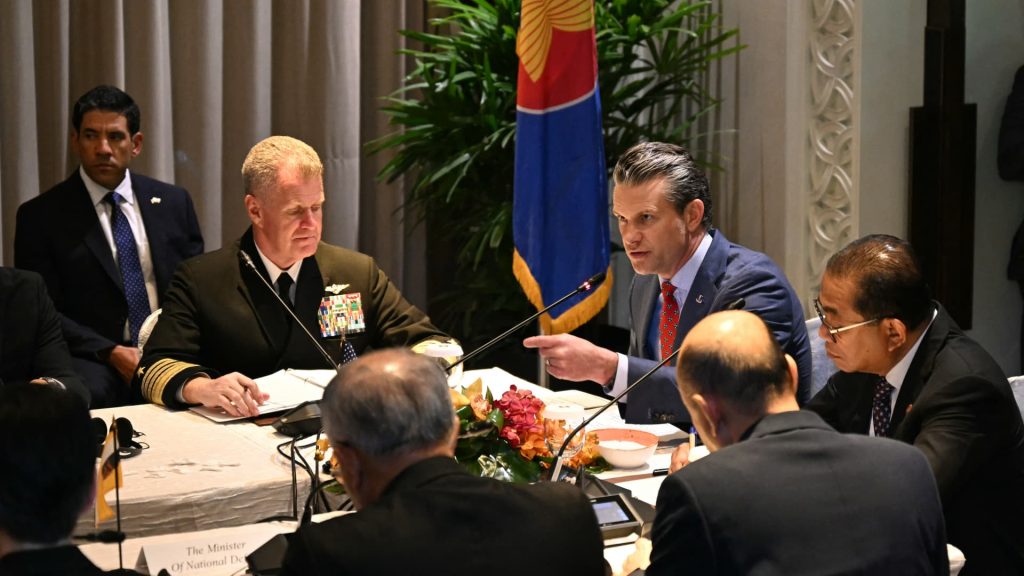At the recent Shangri-La Dialogue in Singapore, U.S. Secretary of Defense Pete Hegseth issued a stark warning regarding the growing military assertiveness of China, urging nations in the Indo-Pacific region to bolster their defense capabilities. Amidst escalating global tensions, including conflicts in Ukraine and Gaza, Hegseth insisted on urgent military cooperation and increased defense spending among allies to counter China’s influence, especially in the South China Sea and around Taiwan. The absence of China’s Defense Minister at the summit raised eyebrows, indicating potential avoidance of direct engagements over contentious issues.
| Article Subheadings |
|---|
| 1) U.S. Readiness to Counter China |
| 2) The Absence of China’s Top Defense Official |
| 3) Enhancing Taiwan’s Defense Capabilities |
| 4) The Impact of Trade Frictions |
| 5) Strategic Implications for Regional Security |
U.S. Readiness to Counter China
During the Shangri-La Dialogue, Pete Hegseth articulated a clear message: the United States is prepared to “fight and win” against China should its efforts to deter aggression fail. Hegseth’s remarks come at a time of rising militarism in various regions, notably due to conflicts like the ongoing war in Ukraine and the situation in Gaza. He emphasized that U.S. allies must collaborate closely and increase their military expenditures. He stated, “Our defense spending must reflect the dangers and threats we face today, because deterrence doesn’t come on the cheap.” This call to action urges countries within Asia to recognize and respond to China’s growing military presence and assertiveness in neighboring seas.
The Absence of China’s Top Defense Official
Notably, the absence of China’s Defense Minister Dong Jun from this year’s Shangri-La Dialogue marked a significant deviation from previous years, where high-level military representation was expected. Instead, China sent a lower-ranking delegation led by Major General Hu Gangfeng, indicating a potential shift in Beijing’s approach towards international military dialogues. Absence from such high-profile forums could be interpreted as an attempt by China to control the narrative surrounding its military engagements. Experts suggest that this decision may reflect an avoidance of open confrontation with the U.S. over contentious regions including Taiwan and the South China Sea. As the dialogue continues, much is left to ponder regarding the implications of China’s choice to downscale its presence at such a pivotal event.
Enhancing Taiwan’s Defense Capabilities
The U.S. government is reportedly set to increase its military assistance to Taiwan significantly, proposing arms packages that exceed the previously authorized amounts during past administrations. This initiative intends to focus on cost-effective defense systems, including missiles and drones. Such moves are critical in enhancing Taiwan’s capabilities to deter pressures from Beijing, which has consistently claimed sovereignty over the island, threatening reunification by force if necessary. The U.S.’s ongoing support for Taiwan has drawn ire from China, as the U.S. seeks to strengthen the island’s defensive measures amidst the potential for coercive actions from the mainland.
The Impact of Trade Frictions
As the dialogue unfolded, tensions stemming from trade discrepancies between the U.S. and China were a recurrent theme. Scott Bessent, Treasury Secretary, noted that U.S.-China trade negotiations have stalled recently, adding to the already fraught relationship between the two superpowers. The sharp rhetoric from U.S. officials regarding military preparedness parallels concerns regarding economic security, suggesting that trade wars and tariffs are intertwined with broader geopolitical tensions. Any attempts to mitigate these tensions will likely require significant engagement from both sides, moving beyond economic talks to address the military implications of their interactions.
Strategic Implications for Regional Security
The ongoing developments raise significant questions about regional security dynamics. Hegseth’s assertions, alongside his call for stronger military collaboration among allies, underline a strategic pivot in response to China’s perceived threats in the Indo-Pacific region. With Japan, Australia, and other allies influenced by Washington’s viewpoint, resistance to China’s regional ambitions is gaining momentum. The burgeoning tensions indicate that the stakes are high, not only in military terms but also in terms of trade and diplomatic relations.
| No. | Key Points |
|---|---|
| 1 | U.S. Secretary of Defense Hegseth warns of readiness to combat China if necessary. |
| 2 | China’s Defense Minister’s absence raises questions about military engagement. |
| 3 | Increased U.S. military aid to Taiwan is planned amid rising pressures from Beijing. |
| 4 | Trade negotiations between U.S. and China have stalled, complicating relations. |
| 5 | Regional security dynamics are shifting as allies prepare for potential conflicts. |
Summary
The recent Shangri-La Dialogue in Singapore spotlighted heightened tensions surrounding U.S.-China relations and underscored the growing concerns over regional security in the Indo-Pacific. U.S. Secretary of Defense Pete Hegseth reinforced the necessity for allied nations to bolster their defense capabilities in response to increasing military assertiveness from China, particularly in sensitive areas such as Taiwan. The strategic implications of these discussions are profound, as they illustrate a shifting landscape in global military dynamics, with potential ramifications for trade and diplomacy.
Frequently Asked Questions
Question: Why was China’s Defense Minister absent from the Shangri-La Dialogue?
China’s Defense Minister, Dong Jun, was absent from the summit likely to avoid engagement over contentious military issues and to control the narrative surrounding China’s military policies.
Question: What military support is the U.S. providing to Taiwan?
The U.S. plans to ramp up weapon sales to Taiwan, focusing on cost-effective systems such as missiles and drones, as a means to enhance Taiwan’s deterrence capabilities amid increasing pressure from Beijing.
Question: How do U.S.-China trade tensions affect military relations?
Increasing trade tensions between the U.S. and China complicate military relations, as discussions surrounding military preparedness and economic security become interlinked, making cooperation and diplomatic engagement more challenging.
